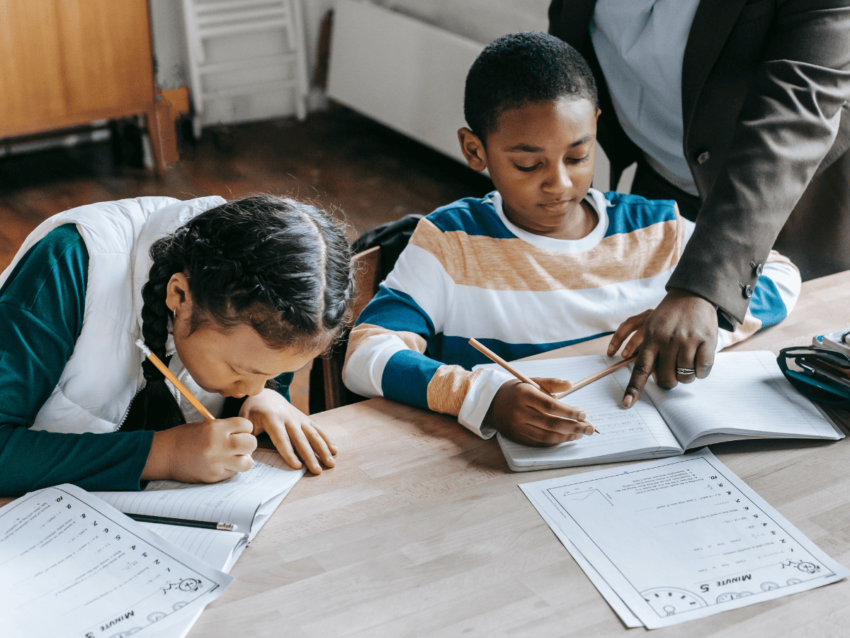
Tutoring for 21st Century Skills for Success in The Modern World
As we navigate the complexities of a rapidly evolving world, “Tutoring For 21st Century Skills for Success in The Modern World” has become an imperative focus. Our educational systems must pivot to incorporate teaching 21st century skills that prepare students not just academically, but also equip them with essential life and career skills.
Finally, “Tutoring For 21st Century Skills for Success in The Modern World” underscores the growing importance of tutoring services in shaping future success stories – a compelling argument that invites us all to rethink our approaches to education today.
Table of Contents
The Importance of 21st Century Skills in Modern Education
In today’s fast-paced world, education is no longer just about memorizing facts. It’s about developing essential 21st-century skills that prepare students for success in their future careers and lives.
Why the shift in educational focus?
Countries around the world are intentionally integrating innovative strategies to develop well-rounded individuals who possess cognitive abilities and social-emotional skills crucial for success.
- Cognitive Abilities: How people perceive, think about, and remember aspects of their environment.
- Social-Emotional Skills: Critical soft skills such as empathy, resilience, self-awareness, and emotional intelligence that help individuals interact effectively with others.
The role of social-emotional skills
SEL has been widely acknowledged for its effects on both educational performance and mental health in students, making it a popular subject of research. According to a study published by the Review of Educational Research, SEL programs can lead to an 11 percentile-point gain on standardized test scores while improving attitudes towards oneself and others along with positive classroom behavior.
“Tutoring For 21st Century Skills” aims to nurture resilient individuals who can adapt amidst change, demonstrating effective communication, collaboration, efficiency, and creative problem-solving using critical thinking abilities.
Let’s delve deeper into some global strategies adopted by different countries aimed at developing key competencies within students…

Strategies from Around the Globe
In our interconnected world, educational strategies are as diverse as they are innovative. Different countries have unique approaches towards developing key competencies within students. From Seattle’s emphasis on six primary 21st-century competencies to Seoul’s exam-free semester initiative encouraging creativity and innovation, there is a wealth of methods at play worldwide.
Examining Seattle’s Approach Towards Fostering Vital Capabilities
The Seattle school district has identified six essential 21st-century skills: critical thinking, communication, collaboration, creativity, information literacy, and technology literacy. These capabilities form the foundation of their teaching approach across all subjects and grade levels, and are practical skills that prepare students for success both academically and in their future careers and personal lives.
- Critical Thinking: Analyzing situations critically by considering various perspectives before making decisions or forming opinions.
- Communication: Developing effective verbal and written communication abilities among students so they can express ideas clearly and persuasively.
- Collaboration: Promoting teamwork through group projects where each student contributes effectively towards achieving common goals.
- Creativity: Encouraging imagination by providing opportunities for creative expression in art, music, or other forms of self-expression.
- Technology Literacy & Information Literacy: Promoting digital competency including understanding how technology works along with the ability to discern reliable sources of information online.
Unpacking Seoul’s Exam-Free Semester Aimed at Reducing Pressure
In contrast, Seoul’s education system takes a different route by implementing an ‘exam-free’ semester for middle schoolers. This initiative aims at reducing academic pressure while promoting experiential learning activities such as field trips or club activities which foster creativity and innovation. It encourages holistic development beyond traditional classroom-based learning models emphasizing more on real-world experiences, thereby preparing youngsters better for life outside academia.
This global perspective offers valuable insights into how tutoring services today must adapt if they wish to remain relevant in shaping future success stories amidst rapidly changing societal expectations around education.
Key Takeaway:
Different countries have unique approaches towards developing key competencies within students. Seattle’s emphasis on six primary 21st-century competencies to Seoul’s exam-free semester initiative encouraging creativity and innovation, offer valuable insights into how tutoring services today must adapt if they wish to remain relevant in shaping future success stories amidst rapidly changing societal expectations around education. The Seattle school district has identified six essential 21st-century skills: critical thinking, communication, collaboration, creativity, information literacy, and technology literacy which form the foundation of their teaching approach across all subjects and grade levels while Seoul’s education system implements an ‘exam-free’ semester for middle schoolers aiming at reducing academic pressure while promoting experiential learning activities such as field trips or club activities that foster creativity and innovation beyond traditional classroom-based learning models emphasizing more on real-world experiences thereby preparing youngsters better for life outside academia.
Integrating Life-long Learning Attributes into Curriculum
In the face of ongoing development and transformation in society, teachers are increasingly aware of the significance of providing students with aptitudes for life-long learning. To be successful in the ever-changing world, students must develop critical thinking, problem-solving abilities, communication skills and adaptability – all beyond traditional subject areas.
Exploring New Denver’s Integration Strategy
New Denver is leading the way in this educational shift by integrating lifelong learning attributes into its curriculum system-wide. The city’s schools have adopted a comprehensive approach that focuses on fostering self-directed learners who can navigate complex information landscapes with ease. This strategy involves teaching technology skills, communication skills, and project-based learning across all grade levels.
- Technology Skills: In an age where technology permeates everyday life, it’s essential that young people develop strong digital literacy skills. New Denver schools ensure their students are well versed in using various technologies responsibly and effectively.
- Communication Skills: Effective communication is a vital career skill that is taught in New Denver schools. Students learn how to express themselves clearly and listen actively to others.
- Project-Based Learning: By incorporating project-based learning, these institutions teach students how to apply knowledge practically while working collaboratively – a key career skill needed for future success.
Potential Benefits of This Method
The benefits of this method extend far beyond academic achievement alone. By preparing students for real-world challenges ahead through practical application of knowledge rather than memorization, they become better equipped to handle whatever comes their way post-schooling.
This approach also fosters resilience as it teaches students how to learn from failure rather than fearing it – an invaluable lesson not just academically but personally too. Furthermore, by encouraging independence and self-direction early on, we’re nurturing individuals capable of continuous growth throughout their lives; thereby promoting lifelong learning which is vital in our ever-changing world.
Apart from personal development benefits such as improved confidence or motivation towards education itself due to active engagement during lessons, there are significant societal implications too. When young people possess these core competencies, they’re more likely to contribute positively within communities whether through innovative solutions to problems faced or meaningful participation in civic matters, thus helping create stronger societies overall.
Key Takeaway:
New Denver schools are integrating lifelong learning skills into their curriculum to prepare students for success in the modern world. This approach includes teaching technology and communication skills, as well as project-based learning, to foster self-directed learners who can navigate complex information landscapes with ease. By incorporating these competencies early on, students become better equipped to handle real-world challenges post-schooling and contribute positively within communities.
Self-Assessment as a Tool for Skill Development
In Hiroshima, Japan, students are taking charge of their education with an innovative approach – self-assessment rubrics. This method not only instills responsibility and accountability but also fosters personal progress in students.
Evaluating Hiroshima’s Self-Assessment Rubric Model
The Hiroshima model is built on the premise that learning should be student-centered. It encourages learners to evaluate their own work against predefined criteria or standards set out in a rubric. Students are encouraged to assess their own progress, pinpoint areas that need improvement and set objectives for future learning.
This unique approach aligns with “Tutoring For 21st Century Skills,” emphasizing critical thinking and problem-solving abilities among other pertinent skills necessary for success in the 21st century world.
- Critical Thinking: By engaging in self-assessment activities, students learn how to analyze information objectively and make reasoned judgments – key components of critical thinking.
- Problem-Solving Abilities: Through reflection on past performances during self-assessments, students identify challenges encountered along the way which helps them develop effective strategies for overcoming similar obstacles in future tasks – enhancing their problem-solving capabilities.
Identifying Ways it Encourages Personal Growth
Beyond developing academic competencies like critical thinking and problem-solving skills, this model also promotes personal growth through fostering qualities such as resilience and adaptability amidst change – all crucial aspects emphasized under “Tutoring For 21st Century Skills.”
- Resilience: When learners evaluate themselves honestly using these rubrics, they inevitably encounter shortcomings or failures which can initially be discouraging. However, facing these realities head-on builds resilience, enabling them to bounce back stronger from setbacks.
- Flexibility & Adaptability: A significant part of self-evaluation involves adapting one’s approaches based on feedback received, thus promoting flexibility and adaptability – essential traits needed to navigate today’s ever-changing world effectively.
Hence, it becomes evident why many tutoring services are now integrating this kind of methodology into their programs. They understand the importance of preparing students beyond conventional subjects, focusing more on real-world challenges ahead – something at the core of our service offering here at EXCELTIX. To find out more about our offerings, do visit our website.
Key Takeaway:
The article discusses the use of self-assessment rubrics in education, particularly in Hiroshima, Japan. This method promotes personal growth and development of critical thinking and problem-solving skills, which are crucial for success in the modern world. Tutoring services are now integrating this methodology into their programs to prepare students beyond conventional subjects.

Tutoring Services Shaping Future Success Stories
As we venture deeper into the 21st century, it’s becoming increasingly clear that traditional education methods are not enough to prepare students for the challenges of modern life. The world is evolving at a rapid pace, and our approach to tutoring must evolve with it. This means going beyond conventional subjects and equipping students with skills they’ll need in real-world scenarios.
The Growing Importance of Tutoring Services in Shaping Future Success Stories
Today’s world necessitates the possession of cognitive abilities, like problem-solving, communication aptitude and collaborative techniques; no longer are they considered optional. These core competencies form part of what we call “Tutoring For 21st Century Skills.” But how do these elements translate into actual learning experiences?
Critical thinking involves evaluating information objectively and making reasoned judgments. Rather than simply memorizing facts, teaching students to comprehend concepts deeply so that they can utilize them in various circumstances is essential.
Problem-solving abilities empower learners to navigate complex situations independently or collaboratively by finding innovative solutions rather than relying on pre-set answers.
Effective communication isn’t merely about speaking eloquently; it includes listening actively, understanding others’ perspectives, and expressing oneself clearly both verbally and nonverbally.
Collaboration requires working harmoniously within diverse teams towards common goals while respecting individual differences and negotiating conflicts constructively when necessary.
Nurturing Resilience Amid Change
Beyond these foundational skills lies another critical aspect – resilience adaptability amidst change. In an ever-changing world where new technologies emerge every day, altering job landscapes unpredictably, fostering resilience adaptability becomes crucial for survival success alike. Resilient individuals tend to bounce back from setbacks faster, remain optimistic even during challenging times, and display flexibility adapting to changing circumstances without losing their focus or motivation.
Fostering Real-World Competencies through Tutoring Services
- Critical Thinking: Tutors encourage learners to question assumptions, challenge prevailing norms, and think outside the box, thereby nurturing independent thinkers who aren’t afraid to take risks and explore new ideas.
- Solving Problems Creatively: Through hands-on projects and experiential learning activities, tutors help students develop creative problem-solving strategies that go beyond textbook solutions.
- Efficacious Communication: Tutors foster open dialogue among peers, promote active listening, and enhance presentation and writing skills, ensuring each student communicates effectively and confidently.
- Promoting Collaboration: Learners engage in collaborative group tasks, learn the value of diversity, team dynamics, and negotiate disagreements constructively, promoting efficient teamwork.
All these aspects combined provide a holistic educational experience, preparing young minds to thrive and succeed amid uncertainties and complexities the 21st century holds, further reinforcing the importance of “Tutoring For 21st Century Skills” in shaping future success stories.
Key Takeaway:
Tutoring services are becoming increasingly important in shaping future success stories as traditional education methods are not enough to prepare students for the challenges of modern life. Critical thinking, problem-solving abilities, effective communication skills, collaboration techniques and resilience adaptability amidst change are essential competencies that tutors must focus on developing through hands-on projects and experiential learning activities. These skills provide a holistic educational experience that prepares young minds to thrive and succeed amid uncertainties and complexities of the 21st century.
Conclusion
Prepare students for success in the modern world with ‘Tutoring For 21st Century Skills’, which offers global strategies and life-long learning integration into curriculum.
Personalized tutoring services are crucial for shaping future success stories by providing support and guidance to develop social-emotional skills, self-assessment abilities, and vital capabilities for academic and personal success.